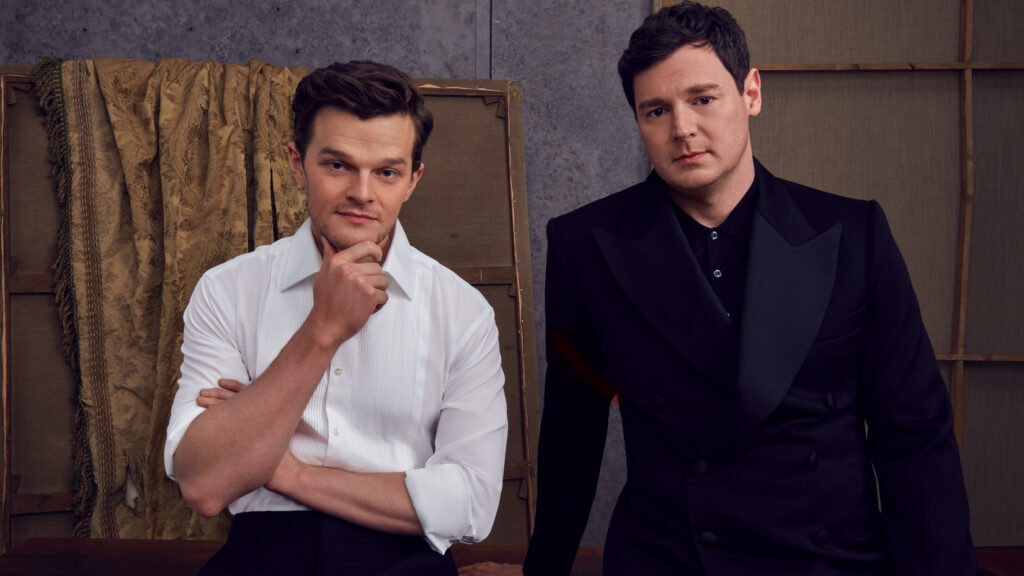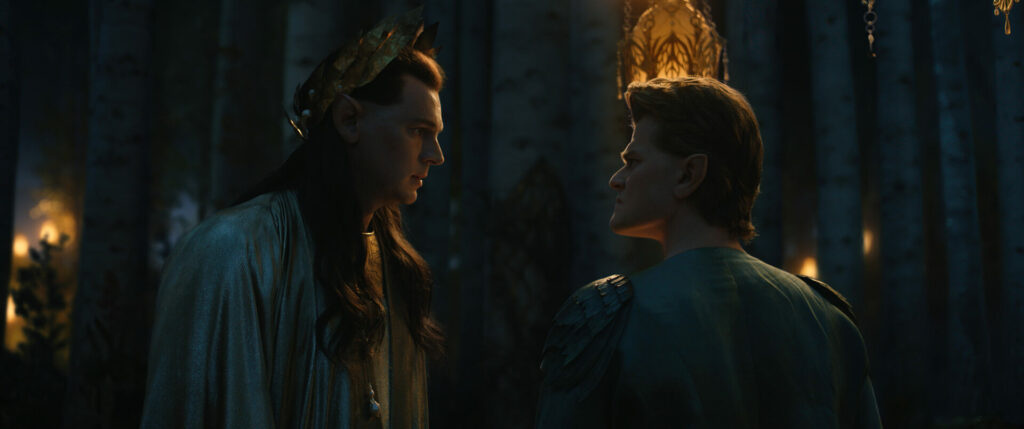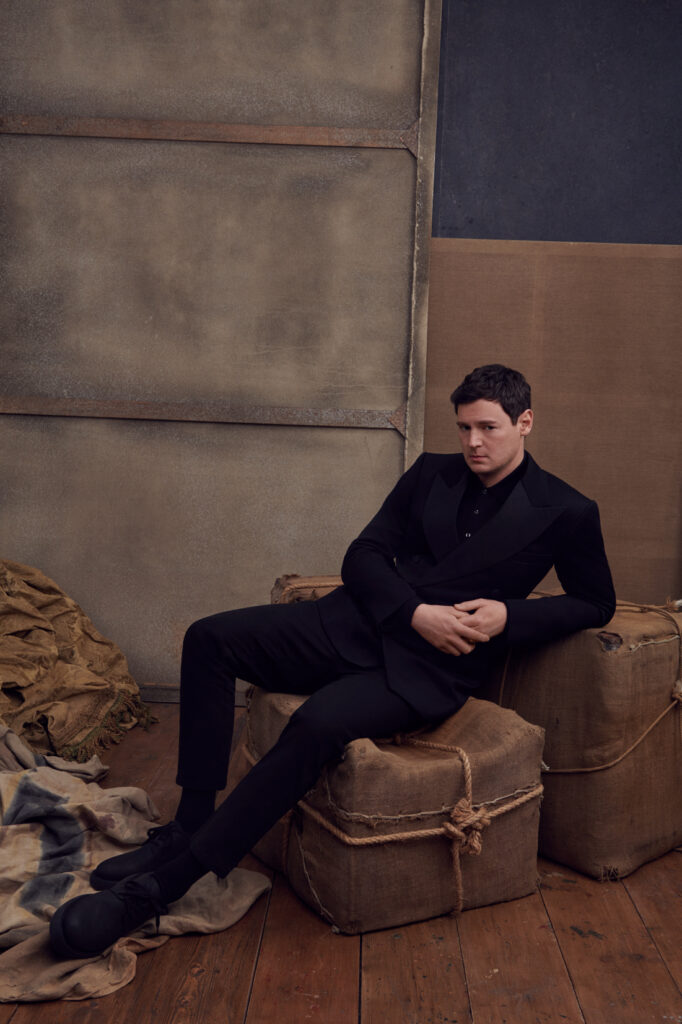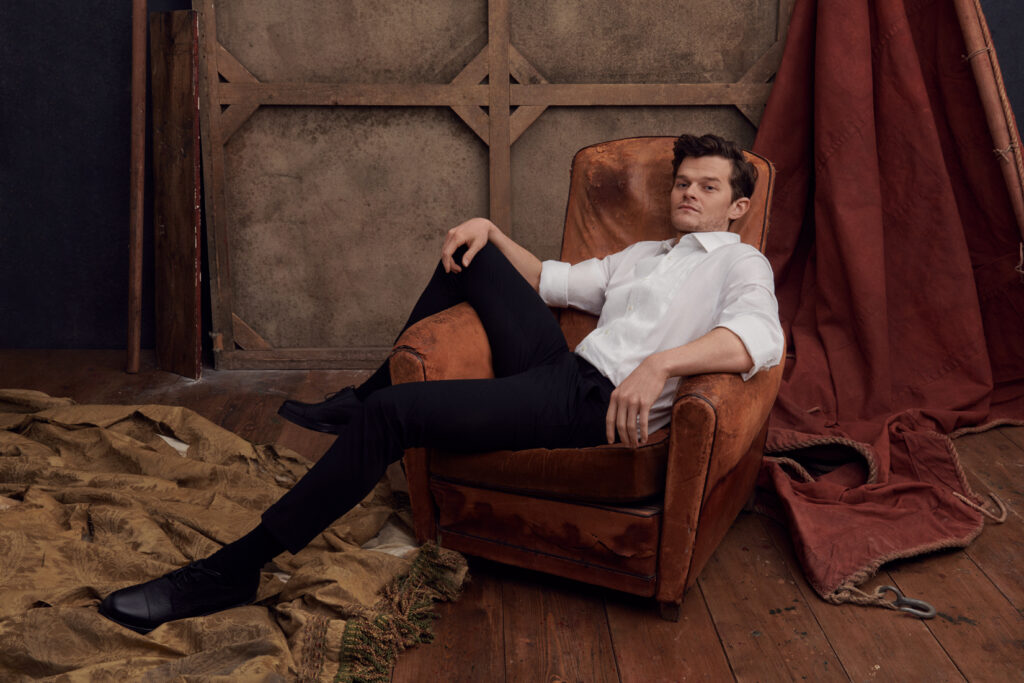Robert Aramayo and Benjamin Walker on starring in ‘The Rings of Power’
The stars of Amazon’s billion-dollar fantasy blockbuster ‘The Lord of the Rings: The Rings of Power’, on the pressure — and privilege — of bringing Middle-earth’s Second Age to the screen
By Paul Kirkley

If Robert Aramayo and Benjamin Walker are feeling the pressure of being front and centre of the most expensive TV show ever made, they’re doing a good job of not showing it.
In fact, bring it on, says Walker, who will bring Gil-galad to life in Amazon’s new billion-dollar Lord of the Rings series, The Rings of Power.
“The pressure is important,” insists the actor, on whose broad shoulders the success of the programme partly rests. “Anything worth doing is worth doing well, so I feel like our best is the bare minimum.”
Besides, he adds, it’s not so much the financial as the emotional investment in the show that feels like the biggest responsibility: for millions of people around the world, the works of J.R.R. Tolkien are something approaching sacred texts. Fortunately, it’s a devotion Walker and Aramayo both caught on to early, a shared passion for the tales of Middle-earth spanning their very different upbringings in the American south (Walker) and the north of England (Aramayo).

“The Hobbit was the first book I ever read,” says Aramayo — who plays Elrond — when the three of us get together over video call in July. “I was quite young, so I’m not sure how much of it I understood, but I loved it. And I was obsessed with the movies — I used to play The Lord of the Rings in the playground.”
Walker was similarly introduced to the Tolkien universe at a young age. “I have an older brother, who was an avid reader, and the first book he ever gave me was The Hobbit,” he says. “I read it because I wanted to be like him, and as smart as he was. So I think we feel as much pressure from ourselves, and our love of the material, as anything.”
Set thousands of years before the events of The Hobbit and The Lord of the Rings, The Rings of Power will, in the words of showrunners Patrick McKay and JD Payne, “unite all the major stories of Middle-earth’s Second Age: the forging of the rings, the rise of the Dark Lord Sauron, the epic tale of Númenor [Tolkien’s equivalent of the Atlantis myth], and the last alliance of Elves and Men”. It’s a period of Middle-earth history that hasn’t been seen on screen, and even in literary terms, is largely confined to The Lord of the Rings’s extensive appendices (along with some of Tolkien’s correspondence, and posthumous publications such as Unfinished Tales and The Silmarillion). “Until now, audiences have only seen the story of the One Ring,” say the showrunners. “But before there was one, there were many…”
Gil-galad, High King of the Elves of the West, is one figure who, until now, has mostly existed in these margins, his exploits chronicled by other characters through story and song. As such, he enjoys a mythic status, even by Tolkien standards. But Walker is typically unfazed. “Again, I don’t see that as a burden. I see it as an opportunity.”
“The most relevant thing, to me, was to look at Elrond’s past, not his future, because there’s so much to achieve”
— Robert Aramayo
The actor’s description of his character could almost be lifted from mythology itself: “Gil-galad is a peacetime politician and a wartime general, and he’s constantly walking that line between the two,” he explains. “He’s also mysterious — he has the gift of foresight, so he’s vibrating on another level; he has his finger on the pulsing of evil in Middle-earth. He’s constantly vigilant.”
I ask Walker if playing such a powerful figure can’t help but rub off on him a bit: does he stride to the on-set catering truck feeling like a king? “Usually when I’m going to the catering truck, I’m tripping over my robes,” he laughs. “But what’s the saying? Everyone knows who the king is because everyone kneels. Otherwise, it’s just another guy in a funny hat. And I’d say the thing that makes me feel most like a king is the presence of my fellow actors.”
Aramayo’s character, Elrond Half-elven — so named because of his mixed Elven/human heritage — will be familiar to people who’ve read The Hobbit and The Lord of the Rings, or seen Peter Jackson’s film adaptations, in which an older Elrond, now Lord of Rivendell, was played by Hugo Weaving. “I love those movies, and I love Hugo Weaving — it’s an honour to play the role he played,” says Aramayo. “But the most relevant thing, for me, was to look at Elrond’s past, not his future, because there’s so much to achieve — there’s so much ahead of him, in order to become the version we’ve seen and read about in the Third Age.
“At this point, he’s young and very eager and curious about the world. He has a love of mortal beings, but it’s a complicated relationship. Him being a half-Elf, and how that makes him different, was something I was really interested to explore.”

This isn’t Aramayo’s first fantasy rodeo. In fact, he seems to have cornered a niche market in ‘younger models of beloved fantasy characters’, having previously played Ned Stark — who would later acquire, then dramatically lose, the head of Sean Bean — in Game of Thrones’sextensive flashback sequences. The difference there, he says, is he had to be much more faithful to the established performance. “I even wore Sean’s wig, and I think I borrowed his sword.”
When HBO launched Game of Thrones in 2011, comparisons were inevitably drawn to The Lord of the Rings. Now, it’s likely to be the other way round, with Amazon looking to carve a slice of the fantasy pie for themselves — a contest given added spice by the launch of Thrones prequel House of the Dragon, just days before The Rings of Power debuts.
“I think there’s enough room at the fantasy table for everyone to eat, right?” says Walker. “But what Tolkien does is encapsulate the time-honoured challenge of light prevailing over darkness, and the constant battle that requires. He drew from mythology, and his religious faith, and we in turn, as storytellers, are drawing from what he’s done, and what other writers have taken and used from him. That’s the cross-pollination of art. Plus I think fantasy is a beautiful place for people to escape these days.”
Amazon, which paid the Tolkien Estate $250m for the rights, has committed to five seasons of the show, totalling 50 episodes. With the initial 10-part run coming in at $58m (plus change) per episode, it adds up to… well, let’s just say it’s a good job Jeff Bezos has deep pockets. Both Aramayo and Walker say they’re in it for the long haul (which is just as well as, Elves being basically immortal, it would be tricky for the writers to bump them off). “It’s not some kind of one and done endeavour,” says Walker. “Amazon is invested in telling Tolkien’s vision, and my job is to buckle up and go along for the ride.”
“What Tolkien does is encapsulate the time-honoured challenge of light prevailing over darkness”
— Benjamin Walker
A stand-up comedian as well as an actor, Walker has long been the toast of Broadway, playing opposite Scarlett Johansson in Cat on a Hot Tin Roof, and earning a Tony nomination for Arthur Miller’s All My Sons. On screen, he’s played the title role in Abraham Lincoln: Vampire Hunter, co-starred with Chris Hemsworth in In the Heart of the Sea, and was the villain/love interest in the final season of Netflix/Marvel’s Jessica Jones.
These days, home for the 40-year-old is London, where he lives with his English wife, actress Kaya Scodelario, and their two children. (America, he says, has become “the Wild West”, and no place to raise kids.) When we speak, he’s dealing with Britain’s unnatural heatwave with his usual equanimity: “I grew up in a small town in Georgia [Cartersville], which has the kind of weather alligators like. So this is kinda refreshing for me.”
Aramayo, 29, was born in Hull, and began his acting career with the city’s fabled Truck Youth Theatre, before winning a place at the prestigious Juilliard performing arts school in New York. Post-Thrones, he’s appeared in Nocturnal Animals, with Amy Adams and Jake Gyllenhaal, played Harley-Davidson co-founder William Harley for Discovery, and was recently seen in Netflix’s batshit crazy — but wildly popular — thriller Behind Her Eyes.
No disrespect to that fine Yorkshire city, but Hull is — both geographically and spiritually — a long way from Hollywood. Does it ever feel slightly surreal, his unexpected journey from there to here? “Well, you can’t beat Hull,” he says. “But yeah, all this does sometimes feel very bizarre. I’m sure that’s true regardless of where you come from, though.”

Both actors have relished going beyond the scripts, and drinking deep from the original wellspring. “That’s been one of the best parts of the job for me,” says Aramayo. “Just diving into the legendaria, and realising there was all this other material that existed.”
“For me, because I had that connection with my brother, I’ve really loved returning to it,” agrees Walker. “If you’re an actor and you’re doing a play, you constantly return to the text. Every time you re-read it, you find something new in the writing.”
The Rings of Power boasts a huge cast, including Morfydd Clark (Saint Maud, His Dark Materials), Peter Mullan, Joseph Mawle (another Game of Thrones graduate), Charles Edwards, and Sir Lenny Henry, who’s playing a Harfoot (a type of early Hobbit). The bond between them strengthened into a real-life Fellowship as they shot the series in New Zealand during the coronavirus pandemic, having been granted an exemption to the strict travel ban that helped to keep the country largely Covid-free. “We were just all together, cloistered, and it was a really unique amount of time, where we all grew quite close,” says Aramayo. “I used to go to Ben’s for Sunday lunch. I honestly don’t think I’d have been able to get by without people like him.”
“All I can say is I was very grateful to have this incredible job, in such an incredible country, and to be together during such a hard time for most of the people on the planet,” says Walker. “New Zealand is such a gorgeous, stunning environment — to say nothing of the kindness and beauty of its people.”
“It’s not some one and done endeavour. Amazon is invested in telling Tolkien’s vision; my job is to buckle up and go along for the ride”
— Benjamin Walker
Not all the beauty we’ll see on screen is natural. “On my first day filming with Rob, we walked into the sound stage, which was basically an empty airplane hangar,” Walker recalls. “And all around us were what seemed like a couple of hundred thousand hand-painted, hand-cut silk leaves — on the ground, in the trees, just adorning the entire space. And you pick up one of these leaves, and you know that for each leaf there’ve been multiple meetings and conversations about the colour, the shape, the size… There are leaves that didn’t make it! And now they’re all scattered through the set, helping create this Middle-earth. You talk about the pressure, but I just look around at this army of artists and craftspeople and… it’s humbling.”
So part of your job is basically not to get in the way of the leaves? “Believe me, I’ve had worse direction than that in my time,” he grins.
Naturally, with a property as cherished as this, there have already been rumblings online about the writers’ plan to compress some of Tolkien’s millennia-spanning timeframe. Something about which Walker, naturally, is sanguine. “That’s not a bad thing, I want people to have opinions,” he says. “I mean, we’re not setting out to polarise. But the worst thing would be for someone to watch and say, ‘OK, where are we getting dinner?’”
With depressing inevitability, there have also been complaints from the mossier corners of Lord of The Rings fandom about the show’s diverse casting that some have labelled “forced”, from the casting of Black actors as dwarves to the “woke rewriting of Tolkien into beta males and alpha females”. To answer those people, says Walker, you just need to go back to the source: “Tolkien tells us that life requires effort to overcome the darkness, that evil is constantly hiding behind a corner. And all it takes is the unification of people — or elves and dwarves — to dry up the weeds. The point is to celebrate the work, and to celebrate one another. And anything other than that probably isn’t really about the show.”
Of course, it’s not just Game of Thrones that people will be judging the show against: Peter Jackson’s Oscar-hoovering movie trilogy dramatically raised the bar for any future Tolkien treatments. “Sure,” nods Walker. “I love those movies. But, again, to do your best is the bare minimum. And that’s what we’re doing.”
The dedication of everyone involved, from the showrunners to the guys cutting out those leaves, is a permanent source of inspiration, says Aramayo. “Every time you step on the set, they constantly wow you, whether they’re creating something completely new, out of nothing, or turning a beautiful part of New Zealand into Middle-earth. At times, you really do feel like you’re in another world.”
And it’s a world, both actors agree, that continues to exert an extraordinary pull on the human imagination, more than a century after John Ronald Reuel Tolkien dreamed up Middle-earth among the spires of Oxford.
“It’s interesting how earlier we referred to The Lord of the Rings, half-jokingly, as sacred texts,” reflects Walker. “Because in a lot of ways, I think that’s true. And not unlike how we’re still going back to society’s sacred texts and reimagining and reinterpreting them, so we’re reinterpreting this, and allowing it to inform our lives as we change as people. The beauty of Tolkien is that it’s so dense, so intricate, so detailed. To bring that to life… it’s really an honour.”
The Lord of the Rings: The Rings of Power is on Amazon Prime from 2 September.
Taken from the October/November 2022 issue of Rolling Stone UK. Buy it online now.
